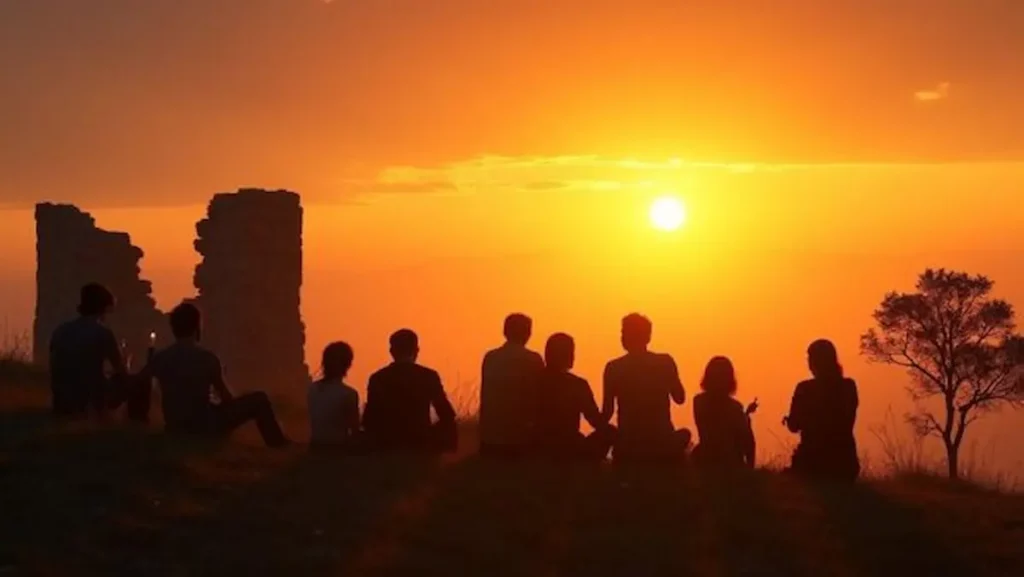From the beginning of time, humans have searched for answers about existence, purpose, and morality. Religion often steps into this role, providing meaning where reason may fall short, and offering not just explanations but comfort, ritual, and community.
But why has religion remained such a constant in human history? The reasons go far beyond belief, touching on psychology, culture, and the universal need for belonging.
Providing meaning and purpose
Religion and the search for meaning and purpose go hand in hand, helping people make sense of life’s big questions.
Through rituals, stories, and moral guidance, religion offers clear frameworks that bring direction and belonging. This spiritual path supports individuals during uncertain times, making it easier to understand life’s complexities.
By engaging with religion, people can find meaning and purpose in daily life, deepen their sense of identity, and connect with a community.
In this way, religion becomes a steady guide for anyone seeking meaning and purpose.
Explaining the unexplainable
Religion and spirituality help people make sense of the unexplainable. When life presents mysteries beyond our understanding, religion offers stories, symbols, and rituals that turn confusion into meaning.
Through these guiding frameworks, spirituality supports individuals in processing mystical experiences, facing existential questions, and building a coherent worldview.
Offering comfort in times of suffering
Religion can be a powerful source of comfort in times of suffering, giving people hope and support when life feels overwhelming. Through simple rituals, prayers, and community gatherings, religion offers grief support that helps individuals process loss and feel less alone.
Many find that spiritual healing builds resilience by nurturing faith in a greater purpose. This sense of meaning can bring peace, strength, and comfort amid pain and adversity, showing how religion can guide us through suffering with compassion and hope.
Establishing moral and ethical guidelines
Religion and ethics often go hand in hand, shaping moral and ethical guidelines that influence human behavior and social interactions. In many traditions, religion integrates ideas from moral philosophy to offer clear standards for resolving everyday ethical dilemmas.
These values help people tell right from wrong, encourage accountability and justice, and support healthy communities. As a result, religion remains a powerful source of ethical reasoning, guiding personal choices and shaping societal norms across cultures and history.
Religion plays a powerful role in creating a sense of community through shared beliefs and rituals. When people gather for worship, meditation, or celebration, these shared rituals bring individuals together in meaningful experiences that strengthen group identity and belonging.
This collective engagement in religion helps people feel connected, supported, and seen within a larger social network. By nurturing social bonds and offering a space for mutual support, religion builds community, fosters social cohesion, and meets a core human need for connection.
Supporting mental and emotional well-being
Belief systems and mental health are closely connected, offering valuable tools for emotional balance.
Belief systems often encourage mindfulness and reflection, helping people build self-awareness and calm. These practices reduce stress and strengthen resilience, making it easier to handle life’s challenges.
In many traditions, religion provides structure and community support through rituals, teachings, and shared values that nurture hope, inner strength, and overall psychological well-being.
Preserving cultural traditions
Religion plays a key role in preserving cultural traditions. While customs change over time, religion helps keep important rituals alive and connects people to their shared history.
Through ceremonies, stories, and values, religion supports cultural identity and passes it on to new generations. In this way, religion serves as a steady bridge between the past and the present, helping communities maintain continuity even as they grow and adapt.
Inspiring acts of compassion and altruism
Religion often emphasizes moral principles and the value of kindness, inspiring compassionate and altruistic behavior in everyday life. This focus on religion encourages selfless acts that help others without the expectation of reward, strengthening both personal spirituality and community bonds.
Many religious communities lead humanitarian efforts, offering aid and support to those in need, which reinforces shared values and promotes social cohesion through collective care and empathy. By engaging with religion and spirituality, people find purpose, cultivate compassion, and create a positive impact in the world.
Facilitating personal growth and self-reflection
Religion and spirituality often become central during moments of introspection and change because they offer clear pathways for self-reflection and growth.
Through practices like prayer, ritual, and meditation, religion provides structured tools that support personal insight and help people examine their values and purpose.
These spiritual practices encourage accountability, transformation, and mindful living.
By turning to religion during pivotal life stages, individuals gain a supportive framework for deeper understanding, meaningful self-evaluation, and long-term personal development.
Conclusion
Religion plays a vital role in human life by offering meaning, comfort, and moral guidance. Through religion, people find answers to life’s big questions, build a sense of community, and cope with challenges in healthier ways. Spiritual practices can also support emotional well-being, encourage compassion, and inspire personal growth. Beyond individual benefits, religion helps preserve cultural heritage and shared values across generations. Ultimately, religion remains a powerful and enduring part of human experience in many societies, shaping identity, purpose, and connection.
Amanda Torati is a linguist and postgraduate researcher dedicated to the study of interfaith dialogue and cultural expression. With an academic background in languages, she specializes in analyzing spiritual texts and universal values to bridge the gap between ancient traditions and modern reflection. At ABPray, Amanda combines her passion for research with a mindful approach, ensuring that every article promotes harmony, respect, and deep spiritual insight for seekers of all backgrounds.
Buddhism
When Buddhism faces its greatest dilemma: religion or philosophy? And why the answer changes inside a meditation hall
The question seems simple until you ask it to a Thai monk, a secular mindfulness teacher in Brooklyn, and a Tibetan scholar all in the same afternoon. None of them will agree. And this disagreement isn’t a problem of language or mistranslation, it’s the living scar of 2,500 years of Buddhism trying to fit into […]
Christianity
The abyss between worlds: why Mormonism and Catholicism represent irreconcilable metaphysics, not mere doctrinal disagreement
Discover the intriguing contrasts between Mormonism and Catholicism, but what hidden truths about salvation and the afterlife will you uncover?
Christianity
The question that breaks itself: why “are Jehovah’s Witnesses Christian?”Reveals something fractured at Christianity’s core
For those curious about the faith of Jehovah's Witnesses, their unique beliefs challenge traditional Christian definitions—what does this mean for their identity?
Buddhism
Beyond the textbook trinity: what really separates Theravada, Mahayana, and Vajrayana
Get to know the three main types of Buddhism, Theravada, Mahayana, and Vajrayana, and discover which path might resonate with your spiritual journey.
Buddhism
Buddhist non-theism is a lie: what I discovered when I stopped accepting the textbook explanation of what Buddhism actually is
Discover insights that could transform your spiritual journey.
Buddhism
I sat with a Hindu Priest and a Buddhist Monk for six hours. Here’s what they revealed about why their traditions can’t agree on anything, including reality Itself
It was 9 AM on a Saturday morning in a rented conference room in Boston, and within ninety seconds, these two practitioners had outlined a chasm so fundamental that I realized this conversation would not be about finding common ground. It would be about understanding why common ground is impossible, and more importantly, why each tradition contains internal contradictions so severe that they can barely agree with themselves.






